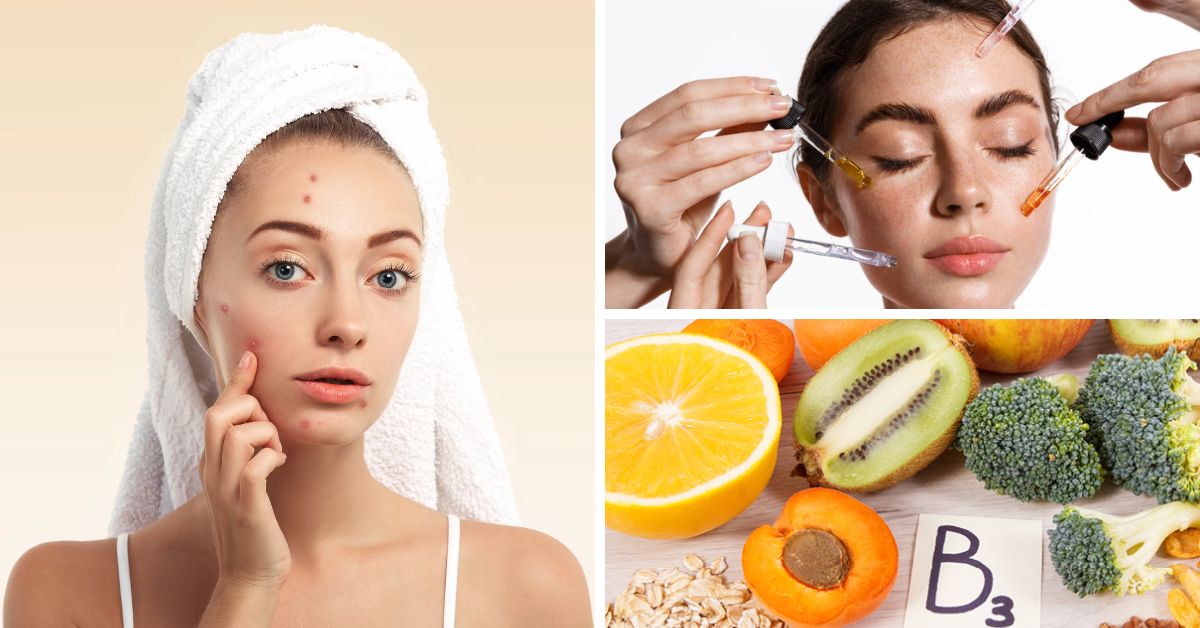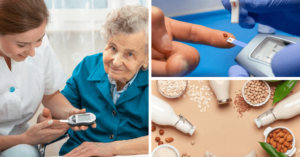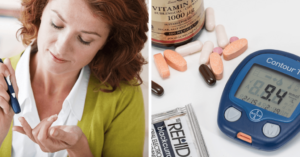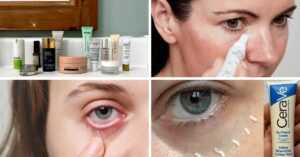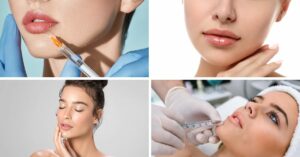Your acne may have persisted for years. You’ve tried many skincare regimes and over-the-counter items without success. What about vitamins? It turns out that specific vitamins can permanently reduce acne. These vitamins regulate hormones, alleviate inflammation, and internally balance the skin.
This article will discuss the best vitamins for acne and how to use them. Expect to be shocked at how a few essential nutrients can improve your complexion and health. Let’s examine the top skin-glowing vitamins!
In This Article
Understanding the Causes of Acne
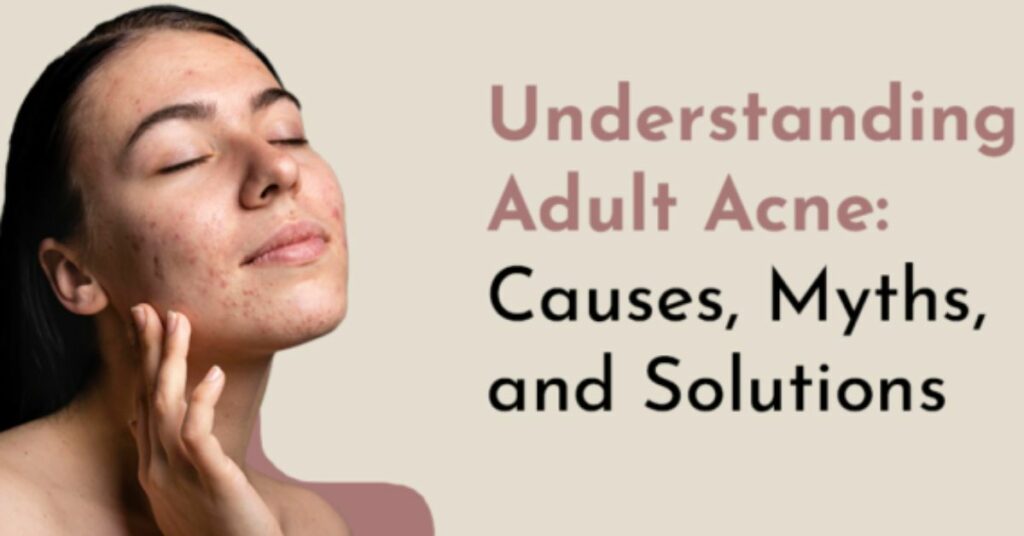
We’ve all had pimples. If acne is a common occurrence, knowing what causes it helps you manage it.
- Hormones usually cause problems. Hormonal changes during puberty boost oil production, clogging pores and causing outbreaks. Hormonal changes from menstruation, pregnancy, menopause, or PCOS can also cause acne.
- Another big factor is stress. Stress increases cortisol and other hormones that overstimulate skin oil glands. School, employment, relationships, and finances might cause breakouts.
- Medication side effects can cause acne. Examples include birth control medications, corticosteroids, and lithium. Check medication guides and with your doctor if new blemishes appear.
- Family history matters, too. You may develop adult acne if your parents did. Genetics determine how responsive your oil glands are to inner and outside acne causes.
Cosmetics, especially oil-based makeup and heavy lotions, can clog pores. Use non-comedogenic, fragrance-free products whenever possible.
Understanding your acne’s causes is the first step to seeking remedies. You can permanently remove imperfections with trial and error!
Vitamin A – The Skin Clearing Superstar
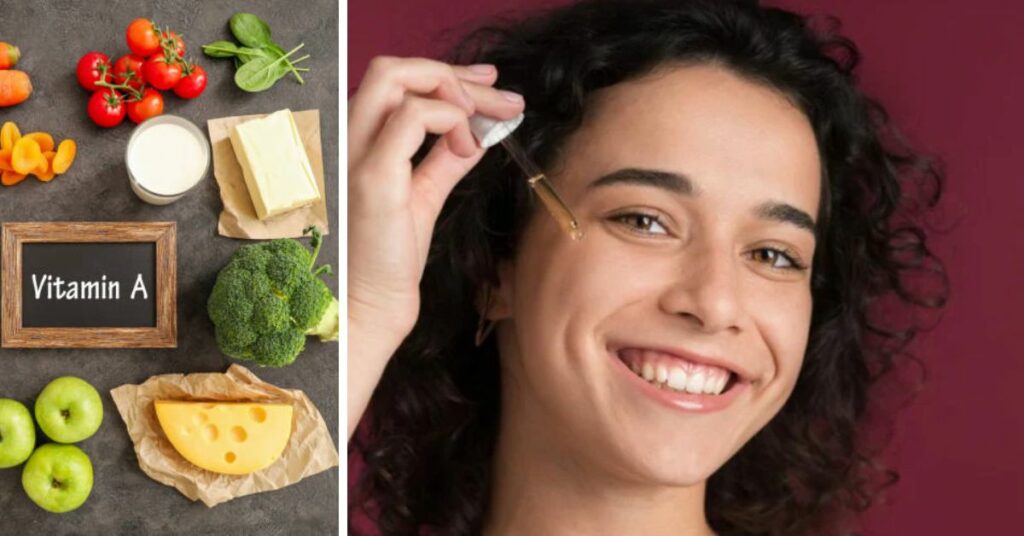
Vitamin A regulates skin cell synthesis, which may surprise you. Without enough, turnover slows, and dead skin cells pile up, blocking pores and causing breakouts and blackheads.
That’s why the best vitamin for acne Vitamin A is essential for clear skin. The lowdown:
Food is your most excellent option. Sweet potatoes, carrots, spinach, broccoli, and bell peppers are high in beta carotene, which your body converts to Vitamin A. Try them 2-3 times per week.
Beef liver is rich in pre-formed Vitamin A for those who want to go all out. Since high doses are dangerous, limit yourself to 3-4 ounces weekly.
Also, supplements work. Check the label for retinol capsules with 5,000 IU of Vitamin A daily. Don’t overdose on this.
Warning: too much Vitamin A can cause liver damage, nausea, and headaches. So eat Vitamin A-rich meals before taking tablets.
And voila!! With enough of this nutritious powerhouse, you’ll quickly have precise, bright skin. Be patient and persistent—your skin will thank you!
Vitamin B Complex to Reduce Inflammation
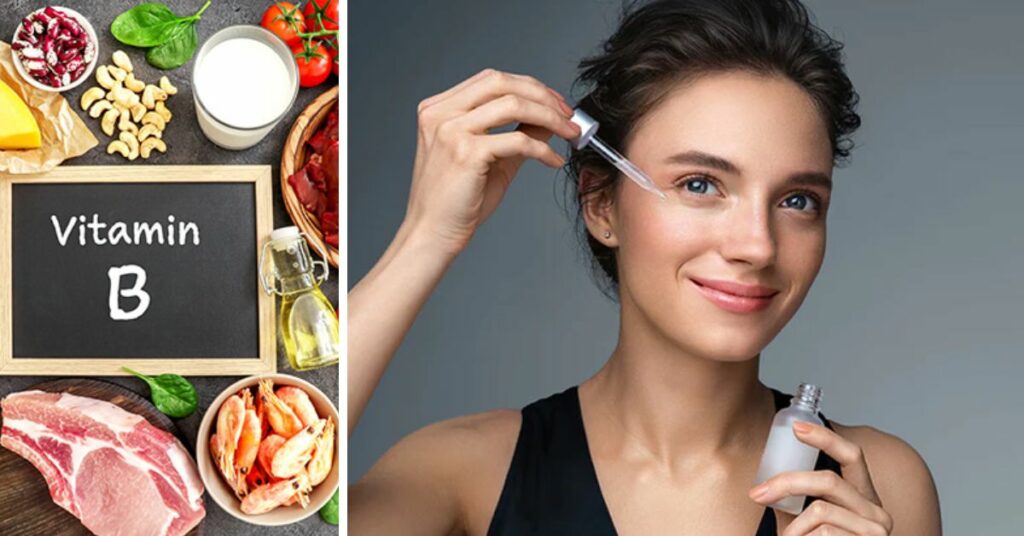
Healthy skin needs B complex vitamins, notably to reduce acne-causing inflammation. The best vitamins for acne are B vitamins, which assist in hormone regulation, collagen production, and skin cell healing.
- B1, B2, B3, B5, B6, B7 (biotin), and B12 are key B vitamins for clear skin. A daily B complex vitamin might help you get enough.
- Vitamin B6 is crucial. It lowers inflammation, balances hormones like testosterone that cause oil production, and may prevent whiteheads and clogged pores.
- Vitamin B3 (niacinamide) enhances skin restoration, decreases inflammation, and controls sebum production. Find a B-complex with 20mg niacinamide.
- Pantothenic acid (B5) relieves acne by reducing oil production and skin cell turnover. Increased moisture retention reduces dryness and discomfort.
Along with a daily B-complex vitamin, eat leafy greens, avocados, eggs, chicken, citrus fruits, whole grains, beans, lentils, nuts, and seeds for B vitamins.
The best vitamins for acne are B-complex supplements and B vitamin-rich foods will brighten your skin. Be patient—acne can take up to 12 weeks as skin cells renew. However, appropriate B vitamin levels promote internal skin clarity.
Vitamin C- A Powerful Antioxidant for Skin
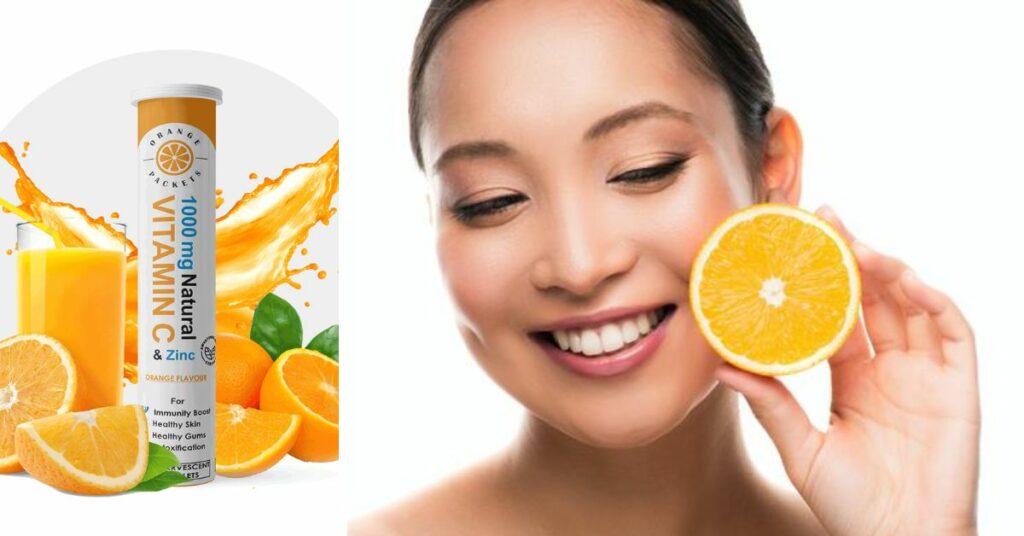
Top acne-fighting vitamins include vitamin C. This powerful antioxidant can reduce acne scars and protect your skin.
Collagen synthesis requires vitamin C. Collagen gives skin structure and flexibility. Your skin grows firmer and more even with collagen. The best vitamin for acne Vitamin C reduces melanin synthesis, which causes dark acne scars. This improves breakout marks and spots.
Also noteworthy is its antioxidant qualities. Vitamin C neutralizes pollution and UV-induced skin aging free radicals. It prevents acne lesions and reduces redness and inflammation. Think of antioxidants as miniature superheroes fighting evil.
Top vitamin C sources for acne-prone skin include:
- Eat more citrus fruits, including oranges, grapefruit, lemons, and limes, or drink citrus juice daily.
- Add yellow/red peppers to salads, pasta, and sandwiches for vitamin C and skin-nourishing ingredients.
- Eat a bowl of fresh strawberries for radiant skin and vitamin C.
- Broccoli – Rich in acne-fighting nutrients. Roast or steam broccoli for a simple side.
- Kiwis are flavorful and rich in vitamin C.
Vitamin C supplements should contain L-ascorbic acid, the most absorbable type. Avoid stomach upset by starting slowly at 500mg daily. Your tolerance will determine whether you climb to 1,000 or 2,000mg.
The best vitamins for acne Vitamin C helps clear acne by increasing collagen formation, fading scarring, and neutralizing free radicals. Eating citrus fruits, peppers, broccoli, berries, kiwi, and other C-rich foods is healthful.
Supplement as needed for optimal daily intake. Results take time, so be patient. Your skin will appreciate it!
Vitamin D- The Inflammation Fighter
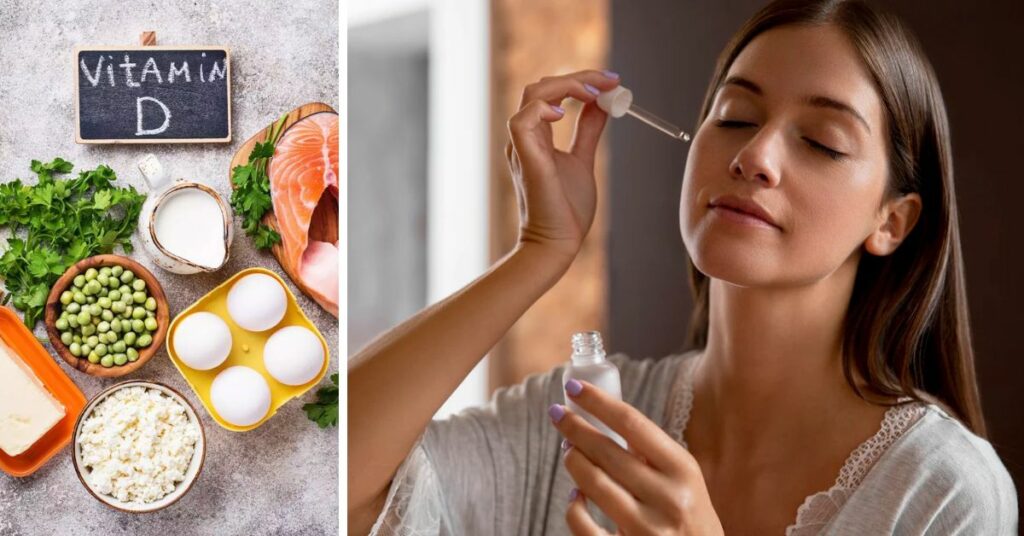
Vitamin D, the “sunshine vitamin”, helps clean skin. The best vitamins for acne reduce inflammation, a primary cause of acne.
- How can vitamin D fight acne? Sunlight-produced vitamin D reduces inflammation. Over 200 anti-microbial peptides controlled by vitamin D kill acne-causing bacteria. It controls skin cell development and shedding. Avoid blocked pores and inflammation by getting enough.
- Get some sun. Skin produces vitamin D when exposed to UV radiation. Try 10-15 minutes sans sunscreen a few times a week. Do not burn! Wintertime oral vitamin D supplements are also available. Daily intake should be 600 IU.
- Eat vitamin D-rich foods. Tuna and salmon are good sources. Milk, eggs, orange juice, cereals, and plant milk are typically supplemented with vitamin D. A balanced diet provides enough of this vital nutrient.
- Try zinc-vitamin D. Some research showed vitamin D plus zinc is better for inflammatory acne than antibiotics. Zinc aids immunological function and wound healing. Together, they reduce inflammation.
- Consider D3 pills if inadequate. Many people lack vitamin D, which can cause skin problems. Get your doctor to check your levels. To restore vitamin D3 levels, take the best vitamins for acne under physician supervision for a few months.
Acne-causing hives can be reduced by receiving adequate vitamin D from sunlight, food, and supplements. Vitamin D, other acne-fighting vitamins, and a healthy lifestyle can help you maintain clear skin.
Vitamin E- Hydrates and Repairs Skin
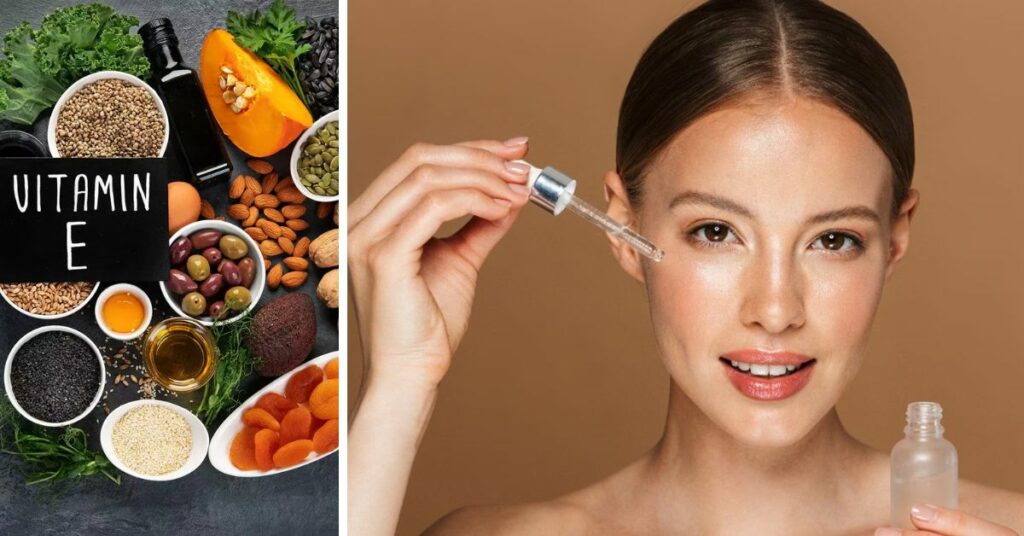
Your new BFF for clear skin is vitamin E—this potent antioxidant hydrates and repairs skin cells, fighting acne.
Vitamin E is essential because it protects the skin barrier, keeping moisture and irritants out. This reduces breakout-causing irritation.
- Cell Regeneration – Promotes healthy skin cell production to replace damaged ones. This rapid cell turnover speeds up acne healing.
- Vitamin E moisturizes without blocking pores due to its emollient qualities. Hydrated skin has less oil and acne.
- Antioxidant and anti-inflammatory qualities reduce post-acne scarring.
When applied topically, the best vitamins for acne, vitamin E helps the skin maintain moisture. Additionally, it prevents UV damage. Combine it with vitamin C in serums or lotions to fade scars best.
Vitamin E can be obtained from capsules, oils, almonds, sunflower seeds, spinach, avocado, and broccoli.
Take a vitamin E supplement or apply oil to problem areas at night for calmer skin. Vitamin E can reduce breakouts and scarring over time.
Zinc
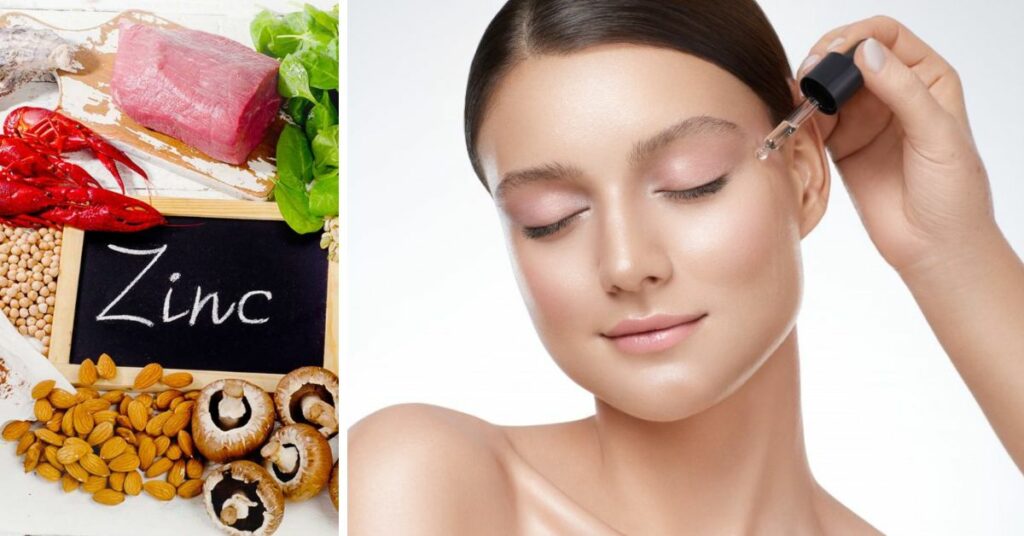
Vitamin C and zinc clean skin. Zinc is a vital mineral that reduces inflammation, fights infections, and regulates oil production.
The best vitamins for acne Zinc deficiency can cause skin issues such as acne, rashes, and eczema.
How Does Zinc Treat Acne?
Zinc helps your skin produce new cells and shed old ones. Your pores can become clogged by old ones without it. Zinc controls, too.
- Zinc reduces sebum production, avoiding pimples by regulating oil glands.
- Zinc reduces inflammation related to red, stinging pimples.
Zinc deficiency symptoms
Zinc deficiency can cause acne, white spots on fingernails, frequent colds or infections, poor sense of taste or smell, and hair loss.
Best Zinc-Rich Foods
Before using supplements, prioritize obtaining zinc from whole foods such as oysters (the best source), meat, seeds, legumes, nuts, and whole grains.
Try to acquire 11mg (men) or 8mg (women) of zinc daily. Citrus fruits and tomatoes include zinc and vitamin C, which improves absorption. Bioavailable zinc supplements may help if your levels are low.
Omega-3 fatty acids
Omega-3s are essential for good skin. Reduced inflammation from omega-3s improves acne. They also moisturize and hydrate skin.
These best vitamins for acne omega-3s are helpful for acne:
- Omega-3 fatty acids EPA and DHA are present in fatty fish such as salmon, mackerel, sardines, and herring. They reduce inflammation and regulate oil production. Aim for 250–500 mg daily.
- ALA: Converts to EPA and DHA in the body. Walnuts, chia seeds, flaxseeds, and soybeans contain it. At least 2 grams of ALA daily.
How to increase omega-3s:
- Eat fatty fish 2-3 times every week. Wild rules.
- Take fish oil supplements with EPA/DHA. Quality brands include Nordic Naturals and Sports Research.
- Add chia, flaxseeds, or walnuts to smoothies, salads, or porridge.
- Use oils like flaxseed and walnut for cooking.
- Indulge on omega-3-rich seaweed snacks.
Getting enough omega-3 fatty acids can reduce inflammation and redness and keep skin hydrated while balancing oil production.
Omega-3s show promise for acne treatment. Clear, healthy skin requires vitamins A, C, and E.
Other Important and Best Vitamins for Acne Prone Skin
Vitamin A and zinc are the best acne-fighting vitamins, but there are others best vitamins for acne. Other vitamins and nutrients can decrease breakouts and support healthy skin. Consider adding these supplements to your routine.
- Vitamin B6: Regulates sebum production, controlling skin oiliness and acne formation. Choose a B-complex vitamin with 25 mg B6. Eat more chicken, potatoes, spinach, and bananas.
- Selenium: An antioxidant mineral that repairs skin damage and prevents free radical damage. Choose a multivitamin containing 70 mcg of selenium. Brazil nuts, tuna, eggs, and spinach are good.
- Probiotic pills, though not vitamins, improve gut health and digestion, reducing inflammation and acne. Find multi-strain probiotics with 5-10 billion CFUs. Also, eat extra yogurt, kefir, miso soup, sauerkraut, kimchi, and kombucha.
Along with the best vitamins for acne A and E, add this all-star combination to your acne-fighting routine. Vitamins, minerals, and probiotics should be balanced for bright skin!
FAQs:
What vitamin can I take to clear acne quickly?
Vitamin A and E supplements can treat and prevent acne by lowering inflammation and healing skin. Since retinoic acid affects skin cell development, vitamin A is crucial for preventing clogged pores. A vitamin A supplement containing retinol or retinoids works best. Within 2 weeks, clearance may occur.
Should I take vitamin C for acne?
Vitamin C is a potent antioxidant and skin protector. Vitamin C strengthens the skin’s barrier, protects cells from oxidative damage, and reduces inflammation, reducing breakouts. Vitamin C is found in citrus fruits, tomatoes, broccoli, and strawberries, but a supplement provides the optimal daily dose for brighter skin.
What other vitamins and minerals help acne?
• Zinc controls oil production and inflammation. Look for zinc gluconate or sulfate supplements.
• Vitamin B complex, including B5, regulates skin cell proliferation and hormone balance.
• Vitamin D aids in skin cell renewal and immunological control. Acne is connected to low vitamin D.
• Selenium, an antioxidant mineral, decreases skin oxidative damage.
How long before acne vitamins work?
Most people see acne improvement after taking acne-fighting vitamins for 4–6 weeks. Although skin cells renew themselves, maximum effects usually require 12 weeks. Be persistent and use vitamins to treat acne.
How should acne vitamins be taken?
Buy high-quality supplements from trusted brands. Mega doses of some vitamins might have adverse effects, so follow dosage directions. Always take acne vitamins with food for the best absorption. Combine supplements with a balanced diet, skincare, and a skin-healthy lifestyle for optimum results.
Conclusion:
A list of the best vitamins for acne that help permanently clear and prevent acne. Vitamins A, C, E, zinc, and D, and several lesser-known skin heroes were covered. Instead of overusing pills, obtain these powerhouse minerals from healthy meals.
Remember the basics: drink water, reduce stress, and sleep well. If you do that, your skin will seem fresh soon. Consistency and patience matter! Follow a healthy routine that works for you to eliminate breakouts permanently. Grab an orange or spinach salad—your skin will thank you!
Read Also:

